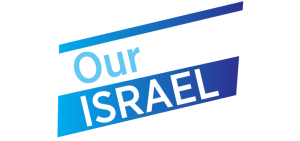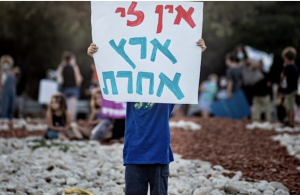- About Us
- Policy Center
- Learn
- Press Room
- Blog
- Get Involved
- Donate
- Donate to J Street Online
- Make a Gift in Someone’s Honor or Memory
- Make a Monthly Gift
- Tax-Deductible Donations
- Giving by mail

J Street’s “Our Israel” project spotlights the amazing Israeli groups who share our progressive vision for Israel, and who are helping build a society underpinned by the founding values of democracy, self-determination and equality which are enshrined in Israel’s Declaration of Independence.

There was much that was the same about May of 2021’s escalation in violence between Israelis and Palestinians–the injustice of the displacement of Palestinian families, the protests and brutal police response, and the ultimate result of Hamas rocket attacks and retaliatory IDF strikes in Gaza.
However, there was at least one significant difference–the massive online response in support of an end to violence and a solution that ensures long-term peace. As the conflict stretched from hours into days into weeks, scene after scene of the suffering faced by both Palestinians and Israelis–from home demolitions to assaults by police to the devastating aftermath of Hamas rocket fire and IDF airstrikes–went viral, causing widespread outrage and condemnation.
“Revolutions start online,” said Eran Nissan, the Chief Operating Officer of Mehazkim, an Israeli organization that works to promote the values and policies of the Israeli left in the digital space. “Social media not only allows the untold stories of disenfranchised voices and marginalized actors to reach new audiences but also provides the tools to effectively organize both digitally and physically.”
While the significant online and offline mobilization stemming from the Gaza escalations in May was a good start down a path towards a movement against the injustices in the region, Mehazkim feels that much more can be done, particularly by the Israeli left.
“The progressive camp in Israel still has many obstacles it must overcome, the largest one being the lack of a unifying narrative which both Palestinian citizens of Israel and center-left liberal zionists can relate to,” said Nissan. “The key for positive change is Jewish-Arab partnership, which we can achieve by creating a shared vision and a clear political path for all citizens of Israel.”
“We see Mehazkim as a loudspeaker for progressives,” Nissan continued. “We support dozens of organizations, initiatives and protests, harnessing the power of our community and sharing our knowledge and experience in social media campaigning with the rest of the progressive camp.”
Between Facebook, Instagram, Twitter and even TikTok, Mehazkim’s content reaches over two million Israelis each month, a nearly unprecedented scale for progressive messaging in the country. From this widespread exposure, Mehazkim sees a number of pathways to progress. One of those is mass persuasion of the Israeli public.
“We are trying to reach into the Israeli mainstream political center and pull it to the left,” said Nissan. “On some issues–climate change, anti-corruption and LGBTQ+ freedoms–that’s relatively easy. On others, particularly the persecution of and human rights violations against Palestinians, it’s very difficult. Our job is not just to use our platforms to move the needle, but to convince our community that cherry-picking your struggles and sitting out on protests makes us weaker because it opens a crack for the opposition forces to divide us. That’s why we emphasize solidarity in all that we do.”
Mehazkim’s wide reach on social media is not just useful for persuasion, but for mobilization of the persuaded. On a number of occasions over the last few years, they have worked with the organizers of various protests and social movements to widely disseminate information about how Israeli progressives can get involved and make their voices heard both online and offline.
One instance where they played a particularly important role was in the 2019 mass mobilization in opposition to the Supreme Court Override Bill, a proposal that would have allowed a simple majority of the Knesset to override any ruling by the Supreme Court, putting a number of progressive policies in jeopardy. Mehazkim widely circulated a series of videos that made clear how important an independent Supreme Court was for progress in Israel, and helped organize significant protests in Jerusalem. The campaign contributed to a shift in public discourse about the law, which eventually failed.

Mehazkim is engaged in these sorts of campaigns on a variety of issues. “We derive our strength from our diversity of issues and our diversity of calls-to-action,” said Nissan. “If you are an activist organizing a demonstration, a parade, a non-violent direct action, an exhibit, a lecture or a party – we will help you make the best of it. We will help you tell your story to millions of Israelis, knowing that some of them are exactly who you are looking for. This is not about a single course of action or a list of activities, this is about creating a diverse political camp which moves together and offers its members many opportunities to act.”
In that vein, Mehazkim’s work is not strictly limited to projecting progressive messaging using its own platforms–they are also focused on curbing the spread of disinformation from their counterparts on the digital right-wing.
“The Israeli internet has been inundated with lies and deceit from right-wing groups, many of whom are using fake accounts to peddle their disinformation,” said Nissan. “Where we want to see an Israel that is more connected, these extremists are doing everything they can to divide us, radicalize us, and incite violence and conflict.”
In response to this flood of misinformation, Mehazkim worked with two other groups to form FakeReporter, a project that investigates fake accounts and extremism on Israeli social media. The group monitors extremist content and calls to violence, traces who is responsible for them and reports the most serious threats to law enforcement.
During the escalation of hostilities between Israelis and Palestinians in May of 2021, social media platforms were rife with misleading and false right-wing content. FakeReporter found that Lehava, a particularly extreme Jewish supremacist group, was using TikTok to spread hate speech and calls to violence. After tireless advocacy, Mehazkim and their partners were able to get the group banned from the platform, at least somewhat stemming the tide of provocative content at a particularly tense historical moment.
Nissan recognizes that the online fight against the right is far from over. “For far too long, the racist and nationalistic dictations of Netanyahu and the right-wing have been the dominant force on social media, telling us who is ‘legitimate’ and who is not. At Mehazkim, we know that the key to winning over the hearts and minds of Israelis and promoting real change is an effective and appealing online presence that can compete with our opponents on the right.”
While most of Mehazkim’s work is focused within Israel, they are constantly looking for more groups and individuals in the US and elsewhere who can lend them online support. “We need to strengthen the alliance, a partnership, between progressives and liberals in the US and in Israel. Movements work best through widespread solidarity, and that applies doubly when those movements are online. If you believe the Israeli left can win, please join us in our efforts.”
To learn more about Mehazkim, visit their website here, and follow them on Facebook, Twitter, Instagram, and TikTok.